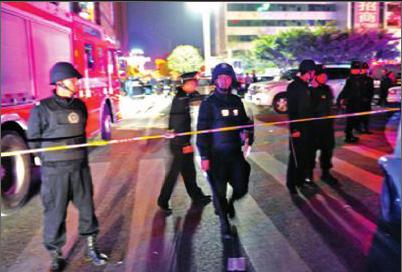Terror in Spring City
2014-03-28ByYuanYuan
By+Yuan+Yuan

Kunming, capital of southwest Chinas Yunnan Province, is known as Spring City for its favorable year-round weather. It has long been regarded as a peaceful and idyllic retreat due to its moderate climate and picturesque scenery. But in an instant, the citys sense of tranquility and peace was left shattered and broken.
The unexpected violence happened on the night of March 1 at the Kunming Railway Station at around 9:20 p.m. The station square was busy with people arriving and departing and the ticket hall was packed with ticket buyers. Meanwhile, a group of people dressed in black and holding long-bladed knives approached and suddenly began slashing and stabbing frantically and indiscriminately at the crowd.
After realizing what was going on, innocent bystanders screamed and scattered in horror. Bodies littered the ground and the smell of blood filled the air.
“At first I thought it was just someone fighting, but then I saw blood and heard people scream, and I just ran,” said Liu Chen, a 19-year-old student from Wuhan, Hubei Province, who was at the railway station with his friends buying train tickets.
People swarmed into the shops and res- taurants around the station square for shelter. Within 10 minutes, armed special police officers arrived and engaged the attackers, killing four on the scene and detaining one female.
The attack lasted for 25 minutes and 29 people were confirmed dead and an additional 143 injured.
A total of 27 medical experts from 12 hospitals in Beijing, Shanghai, Chengdu, Guangzhou and other cities, were being dispatched to Kunming on March 2, helping to treat the wounded and provide psychological assistance.
Over 1,000 civilians, officers and soldiers also volunteered to donate blood in Kunming.
Act of terror
Soon after the terrorist attack, Chinese President Xi Jinping ordered law enforcement agencies to strike out and bring those accountable to swift justice.
Premier Li Keqiang also asked relevant departments to catch and punish the terrorists, and for police authorities at all levels to strengthen prevention and control measures to guarantee safety in public places.
On March 2, the brutal attack was defined by the authorities as an organized, premeditated violent terrorist attack orchestrated by separatist forces from northwest Chinas Xinjiang Uygur Autonomous Region. The three of the group that had been at large were captured one day later and the Ministry of Public Security said in a statement that a terrorist organization led by Abdurehim Kurban was responsible for the attack.endprint
“Some flags belonging to ‘East Turkistanforces were discovered at the site, according to the initial findings of the police. An investigation of the terrorist attack is still under way,” Foreign Ministry spokesman Qin Gang said at a daily news briefing on March 3.
The “East Turkistan” forces, among which the East Turkistan Islamic Movement(ETIM) is a major organization, are one of the primary sources of increasing terrorist attacks in China, particularly in Xinjiang.
“Why are the terrorists so cruel?” cried 50-year-old Chen Guizhen, whose husband, Xiong Wenguang, was killed in the attack.
Chen and her husband were both farmers from Chuxiong Yi Autonomous Prefecture in Yunnan. They were waiting for a train to east Chinas Zhejiang Province at the railway station when the terrorists broke in. Chens husband pushed her away but failed to save himself and was found lying in his own blood by police.
Yang Haifei, a local resident of Yunnan, told Xinhua News Agency that he was attacked and had sustained injuries on his chest and back.
When the attack occurred, Yang was in the ticket hall. “I saw a person come straight at me and I ran away,” Yang recalled. “People who were slower were severely injured and fell on the ground.”
The terrorist attack has fueled anger among people all across the country, with netizens condemning the violent attacks on social networking websites such as Sina Weibo, as well as WeChat, a popular instant messaging service.
A message on WeChat said that although the attack in Kunming created blood and violence, it also awakened a strong sense of justice and strength among the Chinese people.
“No matter what motives the murderers held, the killing of innocent people is against kindness and justice. The police will crack down on the crimes in accordance with the law without any tolerance. May the dead rest in peace,”read the official Sina Weibo account of the Security Management Bureau under the Ministry of Public Security.
“The anti-separatism battle in Xinjiang is complicated and arduous,” said Ashar Tursun, a deputy to the National Peoples Congress (NPC), Chinas top legislature. He added that people from all ethnic groups know the separatists menacing intentions well. “We should be united and focus on Xinjiangs social and economic development,” Ashar Tursun said.
On March 4, President Xi called for resolute opposition to any words and actions that damage the countrys ethnic unity.endprint
“We will build a ‘wall of bronze and ironfor ethnic unity, social stability and national unity,” he said at a panel discussion with members from minority ethnic groups of the National Committee of the Chinese Peoples Political Consultative Conference (CPPCC), the national political advisory body.
Universal support
The carnage has similarly shocked and outraged the international community.
UN Secretary General Ban Ki-moon condemned the attack soon after it occurred.“Terrorist attacks cannot be justified under any circumstances and under any reasons,”Ban said. “This was unacceptable. The perpetrators must be brought to justice.”
Ban conveyed his “most sincere condolences and sympathies to those families of the victims” and wished those injured a speedy recovery. “The international community has suffered too much, [and] too long by these terrorist attacks. We must be united to fight against terrorism,” Ban said.
In a message to his Chinese counterpart Xi, Russian President Vladimir Putin said that Russia resolutely condemns such heinous criminal acts and is willing to further antiterrorism cooperation with China.
Appalled by the reports of the significant loss of life, European Union foreign policy chief Catherine Ashton on March 2 also extended condolences and sympathy to the families who had suffered death and injury.
Stressing that the Pakistani people fully understand and share the pain of the people of China, Pakistans Foreign Ministry said in a statement on March 2 that terrorism in all its forms and manifestations constitutes one of the most serious threats to international peace and security.
“We are ready to extend all possible cooperation to China in combating this menace,” the statement said, adding that “our prayers and thoughts are with the families of the victims of this terrorist attack.”
The United States called the attack in
Chinas Kunming “an act of terrorism” and extended its condolences for the loss of life on March 3.
“The United States opposes terrorism in all of its forms,” State Department spokeswoman Jen Psaki told a press briefing. “We deplore violence intentionally directed at innocent civilians in any case, regardless of the cause,” she added.
On the same day, Chief Cabinet Secretary of Japan Yoshihide Suga told reporters at a news conference that Japan “deplores the indiscriminate mass killing,”offering condolences to the survivors and bereaved families.endprint
Other countries, including Germany, France, Britain, Australia and Afghanistan, all expressed condemnation of the brutal violence that caused heavy casualties.
However, CNN from the United States showed its doubts and disbelief by using quotation marks around the word “terrorists”in its reportage of the Kunming slaughter.
This reaction has drawn a slew of criticism from Chinese media and netizens. “Some Western media outlets, who take apparent stands against terrorism and for human rights, have turned a blind eye to the terrorist attack in Kunming,” said the All-China Journalists Association on March 3.” Some media outlets assumed an ambiguous attitude to the knifewielding terrorists, calling them attackers or activists instead of terrorists.”
“These are double standards,” the association said in a statement. “They have violated the principle of objectivity and have shown a lack professional ethics in journalism. We call on journalists around the globe to obey the code of press ethics, discard political bias and work together to condemn terrorist violence of any form,” it added.
Fu Ying, spokeswoman for this years NPC session, called for more understanding and support from the international community for Chinas fight against terrorism at a press conference in Beijing on March 4.
Terrorism knows no boundaries, Fu stressed.
Updating legislation
In his government work report to this years NPC session on March 5, Chinese Premier Li Keqiang said that the government will strengthen comprehensive maintenance of public order, crack down on violent terrorist crimes, safeguard Chinas national security, create public order and work together to ensure public security in the country.
“The fight against terrorism, separatism and extremism is not about ethnic issues, religion or cultural differences. They are enemies of people of all ethnic groups,” said Saimati Muhammat, a Uygur major general and Deputy Commander of the Xinjiang Military Area Command, “The battle is complicated, harsh, fierce and cruel.”
Violent terrorist attacks have been increasing since 2009 and have become the biggest security threat to Xinjiang.
Some 190 terrorist attacks were recorded in Xinjiang in 2012, increasing by a significant margin from 2011, according to the regional public security department.
The most violent terrorist attack that had caused most civilian deaths prior to the attack in Kunming happened in June 2013 in Lukqun Township, Turpan Prefecture in Xinjiang, when 24 people were killed and 23 others were injured by terrorists.endprint
On October 28 last year, a jeep crashed at downtown Beijings Tiananmen Square, causing five deaths and 40 injuries. Police found gasoline, two knives and steel sticks as well as a flag with extremist religious content in the jeep. The police later identified the deadly crash as a violent terrorist attack. The ETIM, listed by the United Nations Security Council as a terrorist group, claimed responsibility for the attack.
The attack in Kunming has raised questions about why it would be chosen as a location for such an act.
“It is easier for the terrorists to go to Kunming from Xinjiang than to other major cities like Beijing and Shanghai. As a tourist destination, no terrorism had taken place in Kunming before, so security is not as intense as in other places,” said Yin Zhuo, a retired Navy general. “We should launch a nationwide campaign against such terrorist activities and resolutely fight terrorism.”
Yin calls for legislation against terrorism as soon as possible and many other experts have echoed his idea.
China already has a legal framework for the efforts against terrorism based on the Constitution, the Criminal Code and the Extradition Law, but much more needs to be done, according to Zhu Yilong, a CPPCC National Committee member. The NPC Standing Committee adopted a decision to improve anti-terrorism work in October 2011, but it was never made into a law.
“We advise the NPC to make special arrangements for anti-terrorism legislation,” said Zhou Hanmin, a legal expert and CPPCC National Committee member.
Dilnar Abdulla, a Uygur NPC deputy, said that improving anti-terrorism legislation is definitely necessary, adding that she hopes people would realize terrorists “ulterior secessionist motive and the destructive nature of their acts.”
Nurlan Abdumankin, a CPPCC National Committee member from Xinjiang, also urged in-depth studies on the issue of religious extremism.
“The rise of religious extremist activities has instigated ethnic secessionist thought and terrorist acts. Such thought has been used to radicalize people to commit crimes of terror,” said Nurlan Abdumankin.endprint
